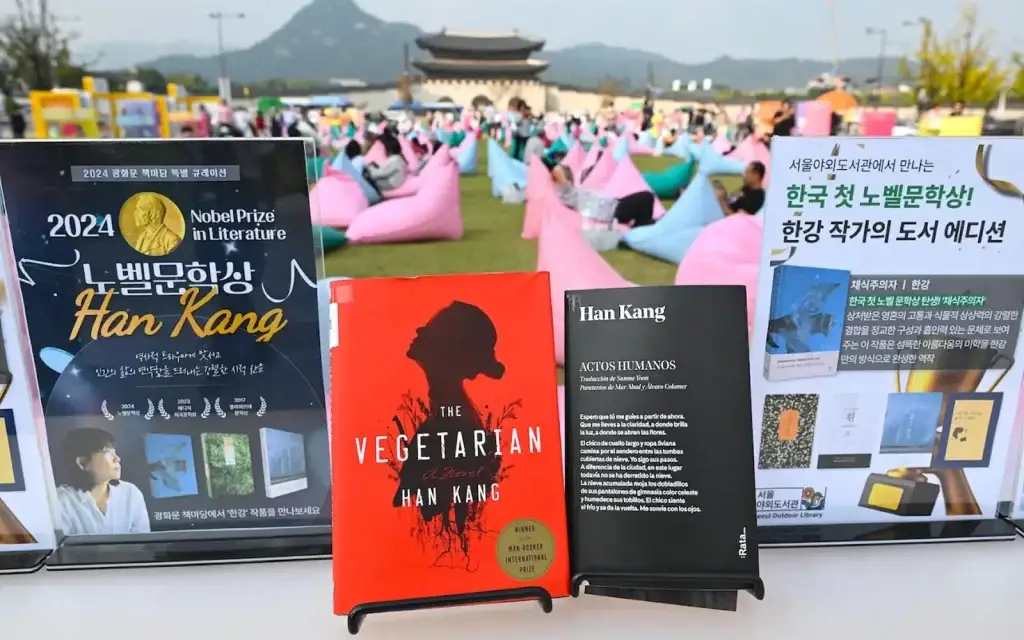Introduction
In the realm of contemporary literature, few voices resonate as profoundly as that of Han Kang. The South Korean author, born in 1970 in Gwangju, has captivated readers worldwide with her introspective and often unsettling narratives. Han’s work, characterized by its exploration of human nature, violence, and the body, has earned her numerous accolades, culminating in the prestigious Nobel Prize in Literature for 2024.
Table of Contents
Her novels and essays, deeply rooted in Korean history and culture, transcend geographical boundaries, speaking to universal human experiences of trauma, identity, and resilience. This blog post delves into the life, works, and impact of Han Kang, examining how her unique literary voice has shaped modern literature and challenged readers to confront uncomfortable truths about society and themselves.
Brief Summary of Han Kang’s Career
Han Kang’s journey as a writer began in the 1990s with her debut work, a collection of poetry. However, it was her transition to prose that marked the beginning of her rise to international acclaim. Her breakthrough came with the publication of “The Vegetarian” in 2007, a novel that would later win the Man Booker International Prize in 2016 after its English translation.

This success was followed by other notable works such as “Human Acts” (2014) and “The White Book” (2016), each further cementing her reputation as a powerful and innovative voice in literature. Han’s writing style, characterized by its lyrical prose and unflinching examination of difficult themes, has consistently challenged and moved readers, leading to her recognition with the Nobel Prize in Literature in 2024.
The Foundations of Han’s Literary Voice
Rooted in Personal and National History
Han Kang’s writing is deeply influenced by her personal experiences and the complex history of South Korea. Born in Gwangju, the site of a significant pro-democracy uprising in 1980, Han’s work often grapples with themes of violence, trauma, and memory. This connection to historical events is particularly evident in “Human Acts,” which directly addresses the Gwangju Uprising and its aftermath.
Exploring the Human Condition
At the core of Han’s work is a profound exploration of what it means to be human. Her narratives often focus on characters grappling with societal expectations, personal desires, and the physical realities of existence. This is perhaps most evident in “The Vegetarian,” where the protagonist’s decision to stop eating meat becomes a metaphor for broader questions of autonomy and identity.
Blending Reality and Surrealism
Han’s unique style often blurs the lines between reality and surrealism. Her prose can shift from stark realism to dreamlike sequences, creating a narrative landscape that mirrors the complex inner worlds of her characters. This approach allows Han to explore difficult themes in innovative ways, challenging readers to engage with her work on multiple levels.
Major Works and Their Impact
“The Vegetarian” (2007)
Han’s international breakthrough, “The Vegetarian,” is a haunting exploration of one woman’s decision to give up meat and the dramatic consequences that follow. The novel’s three-part structure, each narrated by a different character, provides a multifaceted view of the protagonist’s transformation. The book’s themes of bodily autonomy, societal pressure, and mental health resonated with readers worldwide, leading to its translation into numerous languages and eventual Man Booker International Prize win in 2016.
“Human Acts” (2014)
“Human Acts” represents Han’s engagement with Korea’s painful history, specifically the Gwangju Uprising of 1980. Through a series of interconnected narratives, the novel examines the long-lasting impact of violence on individuals and communities. Han’s unflinching portrayal of brutality and its aftermath challenges readers to confront difficult historical truths and consider the nature of human resilience in the face of atrocity.
“The White Book” (2016)
In “The White Book,” Han takes a more experimental approach, blending memoir and fiction to create a meditation on loss, grief, and the color white. Inspired by the brief life of Han’s older sister, who died as an infant, the book explores themes of absence and presence, memory and imagination. Its fragmentary structure and poetic prose showcase Han’s versatility as a writer and her ability to find profound meaning in seemingly simple objects and experiences.
Literary Techniques in Han Kang’s Work
Han Kang employs a range of literary techniques that contribute to the power and uniqueness of her writing:
- Multiple Perspectives: Many of Han’s works, including “The Vegetarian,” use multiple narrators to provide a layered understanding of events and characters.
- Fragmented Narrative: Books like “The White Book” utilize a fragmented structure, mirroring the disjointed nature of memory and thought.
- Symbolism: Han frequently uses symbolic elements, such as the color white or the act of vegetarianism, to explore complex themes.
- Visceral Imagery: Her writing often focuses on bodily experiences, using vivid, sometimes unsettling imagery to connect physical sensations with emotional and psychological states.
These techniques combine to create a reading experience that is both intellectually engaging and emotionally resonant, challenging readers to look beyond surface-level interpretations.
Critical Reception and Impact
Han Kang’s work has been widely praised for its depth, originality, and fearless approach to difficult subjects. Critics have noted her ability to blend the personal with the political, creating narratives that are simultaneously intimate and universal. The international success of “The Vegetarian” not only brought Han to global attention but also increased interest in Korean literature as a whole.
Her Nobel Prize win in 2024 further solidified her position as one of the most important voices in contemporary world literature. The Nobel committee praised Han’s “unflinching exploration of human nature and societal pressures,” noting her unique ability to “illuminate the darkest corners of the human experience with profound compassion and lyrical beauty.”
Conclusion
Han Kang’s journey from a poet in South Korea to a Nobel Laureate represents not just personal achievement but a significant moment in global literature. Her works, with their unflinching examination of human nature, violence, and resilience, have expanded the boundaries of what literature can achieve. By addressing both deeply personal experiences and broader societal issues, Han creates narratives that resonate across cultures and languages.
As we continue to grapple with complex global challenges, Han Kang’s literature serves as a powerful reminder of the importance of confronting difficult truths and the potential for art to foster empathy and understanding. Her legacy as a writer will undoubtedly continue to influence and inspire readers and writers around the world for generations to come.



1 Comment
Pingback: 'Kim Jiyoung Born 1982': Cho Nam-joo's Powerful Critique of Gender Inequality in South Korea - LitGram by MukeshRishit